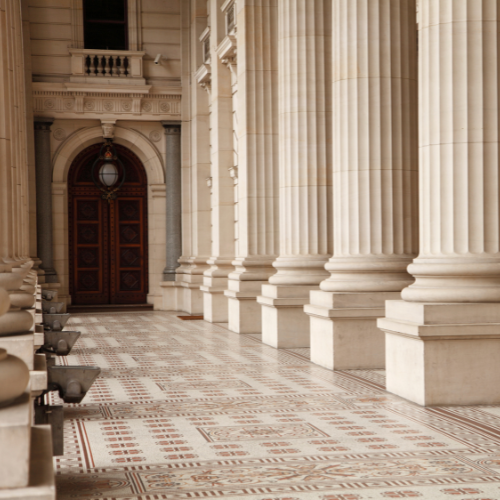The
NP VAN WYK LOUW CENTRE
The purpose of the NP van Wyk Louw Centre is to ensure that the classical university idea (the classical education ideal or the character formation ideal) is established and fostered at Akademia and shared with the larger community.
The highest ideals of the classical university are rooted in the Christian faith and the viewpoints of the Western culture. In other words, Akademia is rooted in ‘Jerusalem’ (the source of our faith); ‘Athens’ (the source of our thoughts) and ‘Rome’ (the source of our sense for order and justice).
From its Christian and classical roots, Akademia is committed to the pursuit of the true, the good and the beautiful.
– Prof. Danie Goosen, executive head: Academics

From its earliest moments, the classical university was committed to shaping the thinking and character of students based on the aforementioned ideals; to prepare them for an excellent professional life as well as for full citizenship in their culture and community.
A central characteristic of today’s university life is to replace the pursuit of the truth, the beauty and the goodness with materialistic, relativistic, pragmatic and individualistic aims. With its commitment to the highest ideals of classical university life, the NP van Wyk Louw Centre offers a directional answer to today’s university life.
What is the
CLASSICAL UNIVERSITY IDEA?
The core of the classical university idea (also the classical education ideal) is concluded in the pursuit of the insight in the truth, goodness and beauty of the creation. In and through this pursuit the ‘academic life’ comes to its full potential.
For the sake of clarity, a distinction can be made between the theoretical and practical dimensions of the classical education ideal. Akademia’s point of view is that both the theoretical and the practical dimensions are important.

Akademia aims to deliver students who are characterised both by an excellent knowledge of their respective disciplines and by insight into the coherence between the different disciplines. Formulated with the aid of the age-old distinction between the ‘parts and the whole’: After completing their studies, students not only possess outstanding knowledge of a partial aspect of the whole, but also insight into the whole itself.
Akademia, by way of the classical education ideal, is also connected to the practical formation of the character of students.
Because of the fragmentation of the Christian-Western world into a multitude of conflicting life and worldviews, universities today are no longer committed to character formation. In lieu of character formation, one-sided emphasis is placed on the individual rights of the unattached student/consumer.
Akademia’s point of view is that character formation in a time of fragmentation represents a guiding ideal for the contemporary student. By means of character formation, students come ‘home’ in a world characterised by a sense of wholeness rather than fragmentation.
Why exactly the
NP VAN WYK LOUW CENTRE?
NP van Wyk Louw represents an intellectual peak in the history of the Afrikaans cultural life. Louw linked himself in his work (among other things in Liberale nasionalisme “Liberal nationalism”) to the above three ‘cities’; the pursuit of truth, goodness and beauty, as well as the central emphasis on the importance of insight in the whole. With the name ‘NP van Wyk Louw Centre’, Akademia commits itself to a recognition and development of the intellectual highlights that Louw represents in the Afrikaans intellectual landscape.
What resorts under
THE CENTRE?
The NP van Wyk Louw Centre is responsible for the following overall tasks:
The centre ensures that the staff of Akademia are trained in the classical education ideal on a continuous basis. Lectures, presentations, discussions, etc., are offered to both ‘old’ and ‘new’ staff.
The centre ensures that the lecturers of Akademia integrate the classical education ideal in their respective disciplines.
The centre ensures that lecturers report on their progress regarding the integration of the classical education ideal.
The centre supports the integration of the classical education ideal in student life (sport, culture, etc.).
The centre supports the integration of the classical education ideal into the general culture on campus. Distinctive university rituals (graduation ceremonies, defence of dissertations, academic processions, etc.), public gatherings (lectures, discussions, etc.) and symbols (own aesthetics, images and metaphors) on campus give concrete expression of the classical education ideal.
The centre is the ‘idea forum’ of Akademia. Through the centre, research is done on fundamental ideas (the historical origins of the contemporary crisis of ideas; the contemporary ‘battle for ideas’ and directional answers).
The centre ensures that the classical education ideal is communicated to the Afrikaans language and culture community by means of, among other things, public lectures and the media in general, and that community is persuaded of its greatness and guiding nature.
The centre ensures that Akademia connects with universities, thought forums and academics in the international world who are committed to the classical education ideal. Such liaison takes place by way of mutual visits, lectures, interviews, and so on.
Since 2021 Dr Carel Boshoff is the first holder of the NP van Wyk Louw honorary chair in cultural criticism.
- The centre is responsible for the management of the NP van Wyk Louw honorary chair in Cultural Studies (arranging honorary lectures on a regular basis, publications of the honorary chair, etc.).
Dr Carel Boshoff was born in Pretoria in 1963 where he went to school and in 1981, he matriculated from Hoërskool Silverton. After that, he studied at the University of Pretoria. In 1992 he entered into the service of the Afrikanervryheidstigting (Afrikaner Freedom Foundation) (AVSTIG) and married Anje Verwoerd in 1994. In 1997, they moved to Orania where he became involved in various capacities, established a family and still resides. Dr Boshoff obtained the following degrees, BA (Theology) in 1985, BAHons (Philosophy) in 1987 and MA (Cultural History) in 1991. He also studied Architecture. In 2021 he registered for his PhD in Philosophy at the University of the Free State and obtained it in 2025. During his career he was the head of Research and Liaison of AVSTIG, member of the Volkstaat Council, chief executive officer of the Orania Movement, member of the Northern Cape Provincial Legislature, president of the Orania Movement and head of the Vryheidstigting (freedom foundation). He is also the writer of various publications.
A lot of the world’s leading universities that form part of the Liberal Arts tradition, read the Great Books. At these universities students are expected to become acquainted with the great texts from tradition in order to make students part of a bigger and age-old discussion. However, it is not a nostalgic exercise. By anchoring students in the tradition and exposing them to the bigger questions of life, these students are equipped to seize the present and the future in a principled manner. This way, full-bodied and well-rounded students are sent into the world with a wide frame of reference, historical knowledge and the necessary idea generation hub to tackle the challenges of the time with confidence.
Akademia’s Great Books Programme tries to bring something of the overseas custom into our own context. The type of foundation that the reading of the great texts provides align with Akademia’s classical education ideal. The classical education ideal, which lies at the heart of Akademia, aims to impart both knowledge and wisdom. Thus, to help shape both the mind and heart of students. Akademia has carefully compiled a selected list of Greats Books that students, together with staff from the NP van Wyk Louw Centre, will work through during their studies. These books give students a broad overview of Akademia’s core values as a classical, Christian and Afrikaans institution.
Although the tertiary setup in South Africa does not allow students to spend three or four years solely reading the Great Books, it is a common practice in South Africa to present modules and subjects to students that extend beyond specific fields of specialisation. In these supplementary modules, attention is given to reading and language skills as well as moral formation to prepare students for their studies not only for their studies but also for the workplace. The Great Books Programme at Akademia occupies this place within our student life. The purpose of this programme is therefore not only to expose students to the great texts of our tradition, but also to awaken reading and language skills, as well as the ability to interpret.
Students are exposed to great thinkers like CS Lewis, NP van Wyk Louw, Homer, Augustine and Plato. The staff from the NP van Wyk Louw Centre guide the students through the ideas of these great writers by offering online short courses for the students.
Friends beyond borders
The Akademia: Friends beyond borders conversation series focuses on the international visitors, academic partners and like-minded individuals who visit the institution from across the world. The series aims to provide an insightful look at the conversations, ideas and interactions that speak to Akademia’s nature as a community institution committed to academic excellence.
CONTACT US
Feel free to contact the NP van Wyk Louw Centre at npvw@akademia.ac.za or call (+27)861 222 888.
Bly op hoogte van die NP van Wyk Louw-sentrum se nuus en gebeure




